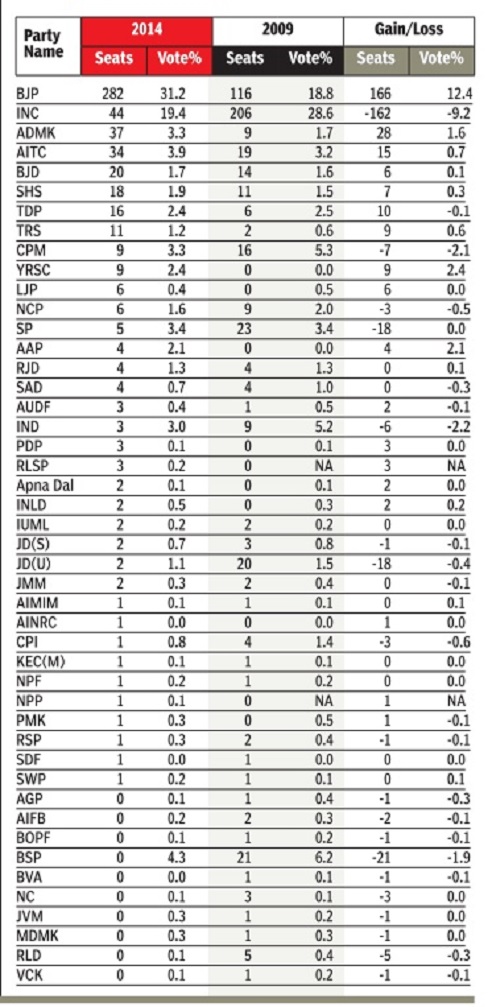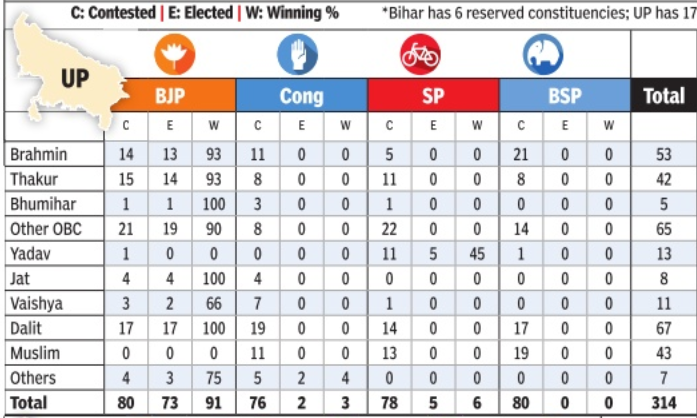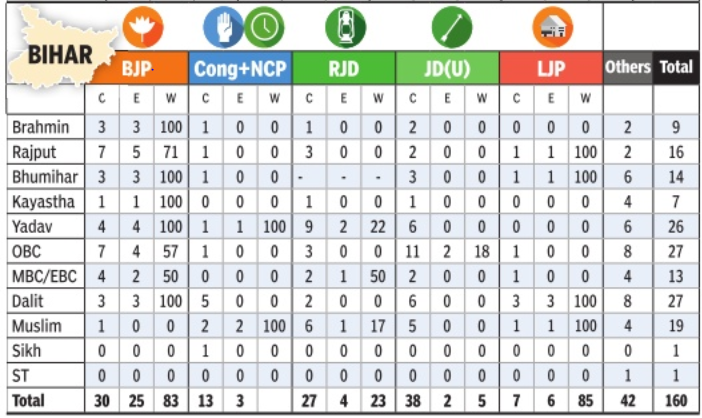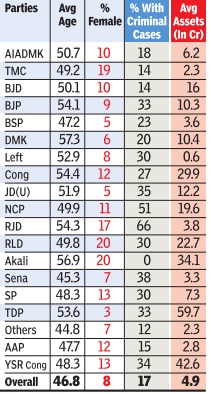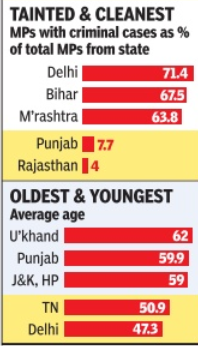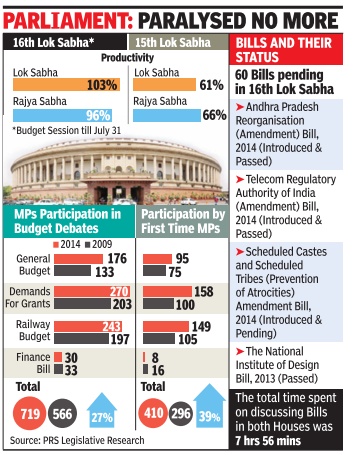The 16th Lok Sabha (2014-19): trends
The page Parliament: India (general issues) has a parallel record of issues that pertain to both the Lok Sabha and the Rajya Sabha
These are newspaper articles selected for the excellence of their content.
|
Contents |
The 2014 elections: electioneering and the verdict
Seats lost or gained in 2014 vis-a-vis 2009
See the graphic: 'Seats lost or gained in 2014 vis-a-vis the 2009 election'
Source: The Times of India
Victory margins in 2009 and 2014
See the chart 'Victory margins in 2009 and 2014'Source: The Times of India
Percentage of votes obtained by winning candidates
LS winners got average of 47% votes: ADR
New Delhi: TIMES NEWS NETWORK
The Times of India Jun 05 2014
This is one race that PM Narendra Modi lost. BJP’s Darshnaben Jardosh from Surat constituency pipped Modi to the post by winning her seat with a vote share of 76%. Jardosh was followed by Modi who won the Vadodara constituency with 73% of the votes polled while Chandrakant Patil from Navsari constituency won with 71% of votes polled.
According to data analysed by Association for Democratic Reforms (ADR), the winners of the Lok Sabha elections garnered an average of 47% of votes polled compared to 44% in the 2009 polls.
Out of 282 winners of BJP, 142 (50%) won with less than 50% of votes polled in their constituency while 37 (84%) out of 44 winners from Congres, 30 (81%) out of 37 winners from AIADMK, 28 (82%) out of 34 winners from Trinamool Congres, 13 (65%) out of 20 winners from BJD and 6 (33%) out of 18 winners from Shiv Sena won with less than 50% of votes polled in their constituency.
The MPs who won with less than 30% of the vote share included Ladakh MP from BJP Thupstan Chhewang who won with 26%, Congres’s Ravneet Singh Bittu from Ludhiana who won with 27% and Azmeera Naik, Mahabubabad from TRS with 29% of the vote and CPM’s Mohammed Salim with 29% of the vote.
Caste and the 16th Lok Sabha
THE HINDI HEARTLAND'S CASTE IN STONE
The Times of India May 19 2014
We like to think of ourselves as global citizens who are part of an emerging economic superpower. But the reality is that politics in several parts of India is still mired in caste and religion. Identity politics lurks below the surface when it's not front and centre. Perhaps nowhere no more so than in UP and Bihar, which with 120 seats between them, account for close to a quarter of total Lok Sabha seats. Candidates are often chosen on the basis of whether they are Dalit or OBC or Thakur or Bhumihar or Brahmin or Muslim.
TOI reporters in UP and Bihar combed through the entire list of candidates of the major contenders in each state to ascertain their caste and religious status. There are a mind-boggling array of castes: From Dusadh, Jatav, Dom, Pasi and Musahar (all SC/Dalit), to Koeri, Yadav, Dhanuk, Kurmi and Barhai (all OBC), to Kahar, Mallah, Gangota and Tanti (all EBC or Extremely Backward Castes, somewhere between SC and OBC), to the upper caste Rajputs, Bhumihars, Kayasths and Brahmins. For reasons of space and convenience, we've clubbed into a smaller handful of groups.
UP and Bihar aren't the only states where caste politics plays a big role: It's there in Andhra, Tamil Nadu, Karnataka, Punjab, Haryana, Rajasthan, and Maharashtra (a reason for Ashok Chavan's resurrection despite the taint of Adarsh is that he's a Maratha). And if it's not caste, it's religion. But nowhere does it cast such a long and imposing shadow, and over such a huge block of seats, as the two `heartland states'. We analysed the `strike rates' of the different castes in the two states
Muslims
See chart: ‘Muslims/ Minorities’
Women
UP, BENGAL TOP LIST OF WOMEN MPs
The Times of India May 19 2014
One-third of West Bengal's MPs are women while states like K'taka, Rajasthan, Kerala and Punjab have just one MP each.
Tamil Nadu, also headed by a woman CM, elected only 4 MPs
See graphic: ‘Women’
Expenditure of political parties
Jan 17 2015
BJP spent Rs 714cr, Congress Rs 516cr during 2014 polls
BJP and Congress spent Rs 1,230 crore between them on campaigning for the 2014 elections to the Lok Sabha and three state assemblies. While BJP ran a poll expenditure of over Rs 714 crore during the April-May exercise, Congress had a bill of Rs 516 crore on its countrywide campaign.
The two leading national parties filed their expenditure statements well beyond the August 26 deadline. Congress declared its poll expenses to the EC on December 22 while BJP was the last national party to do so, filing its election expenditure statement only on January 12.
According to the latest data uploaded on the EC website, BJP and Congress's expenditure in the 2014 Lok Sabha and assembly elections (Andhra Pradesh, Odisha and Sikkim) far surpassed the spending by other recognised national parties like NCP (over Rs 51 crore) and BSP (more than Rs 30 crore).
The EC had, on November 28 last year, issued showcause notices to BJP, Congress and 18 other parties over the delay in filing expenditure statements for the general polls.
According to EC data, Nationalist Congress Party (NCP) spent Rs 51.34 crore in these polls followed by Bahujan Samaj Party (BSP) with an expenditure of Rs 30.05 crore. CPI (Marxist) incurred an expenditure of Rs 18.69 crore.
The EC has not shared the expenditure made in this regard by CPI even though it said the party had submitted the relevant information to it on September 15, 2014.
The commission had also warned these parties that it would withdraw their recognition if the statements were not filed and sent to it.
As per rules, political parties are required to file their election expenditure statements within 75 days of assembly elections while the deadline in case of Lok Sabha polls is 90 days.
Mismatch been candidates’ and parties’ figures
The Times of India, Sep 18 2015
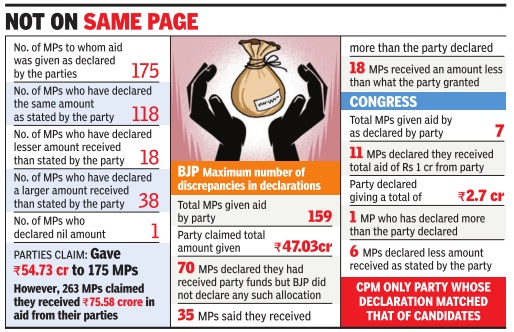
Himanshi Dhawan
Election expenses: Filing by parties, candidates, including PM, don't match
Election expenses of several candidates did not match their party's expenditure declaration according to an analysis by Association for Democratic Reforms (ADR). Among those whose election expenses were either more or less than the expense declaration made by the party included PM Narendra Modi, senior BJP functionary L K Advani, Cabinet minister Kalraj Mishra, LJP's Ramvilas Paswan, NCP's Supriya Sule, Congress MPs Deepender Singh Hooda and K V Thomas among others.
Also, around 70 parliamentarians including Speaker Sumita Mahajan, ministers Uma Bharati, Maneka Gandhi and Jayant Sinha claimed to have received party funds though the party has not declared any expenses towards their campaign.
Out of 342 MPs from national parties, 263 claimed they received poll funds to the tune of Rs 75.58 crore from their parties while the parties declared that they had given a much lower amount of Rs 54.73 crore to only 175 MPs.
The analysis is based on election expenditure statements submitted to the Election Commission by the parties and individual candidates. The discrepancy in data, according to ADR, points to lack of scrutiny of election expenses by the EC. The discrepancy is most pronounced in BJP where the party declared that it had provided aid to 159 parliamentarians allocating a total of Rs 47.03 crore. Of these, 18 MPs claimed to have received less than the party declared as expenses towards their campaign. They included PM Narendra Modi whose affidavit claimed the party gave him Rs 32.53 lakh while the party expenditure statement declared Rs 40 lakh as the fund amount.
Similarly , Advani declared Rs 33.88 lakh as opposed to the party declaration of Rs 41 lakh. A senior EC official told TOI that the commission has taken note of the ADR findings.
The 16th Lok Sabha: Socio-economic composition
Background check of MPs
Extremes
A HOUSE OF EXTREMES
The Times of India May 19 2014
On results day, The Times of India profiled the 16th LS, in terms of the age, gender, assets of MPs & criminal cases pending against them. The day after, The Times of India brought you a party-wise breakup. Today, find out which states sent the richest and oldest MPs, most women and criminals |
See the two graphics: EXTREMES 1 and EXTREMES 2
The avocations of MPs
Rahul a 'strategy consultant', Modi a 'social worker'
Mohua Chatterjee, The Times of India TNN | Jul 30, 2014
West Bengal Congres chief and MP from Baharampur Adhir Ranjan Choudhury may have had a number of criminal cases registered against him, but he lists his profession as "social reformer," according to the Parliament website.
Rahul Gandhi's strategies may not have worked for the Congres in last elections, but in his declaration to the Lok Sabha, the Congres vice-president does not shy away from listing himself as a "strategy consultant".
The profession-wise list of 539 members of the 16th Lok Sabha offers an interesting peek into how our netas prefer to project their identities beyond politics.
The Parliament website lists 33 categories of professions ranging from agriculturists to builders, medical practitioners to educationists, teachers to sportsperson, artists to industrialists and religious missionaries to social reformers.
BJP veteran L K Advani's name figures in the category of "journalists". The party patriarch, an avid blogger, began his professional life with the R S S journal 'Organiser'. Among the other four journalists in LS are BJD's Bhartruhari Mahtab and Tathagata Satpathy. External affairs minister Sushma Swaraj and Speaker Sumitra Mahajan are listed as "advocates" by profession.
Home minister Rajnath Singh calls himself a "teacher". But his party senior Murli Manohar Joshi is registered as "professor". Giving him company is first-time MP Sanjeev Baliyan, whose name incidentally is linked to the Muzaffarnagar riots.
While Congres president Sonia Gandhi is a "political and social worker", Union minister Maneka Gandhi prefers to identify herself as a "writer", probably because she has quite a few published works to her credit.
Indian Test cricketer Kirti Azad has preferred to identify himself as the only one in the "sportsperson" category, while young MP Anurag Thakur is the only one to prefer the "cricketer" tag.
The House has four people registered as "builders," nine "artists" and seven "film artistes". If first-time MP Poonam Mahajan identifies herself as "businessperson", TMC MP Saugata Roy prefers the "educationist" tag.
BJP MP Yogi Adityanath is the only "religious missionary" in the House and Shashi Tharoor the only one to identify himself as a "diplomat".
The wealth of parliamentarians
THE RICH LIST
The Times of India May 19 2014
TOI had carried the overall and party-wise average age and assets of MPs, pending criminal cases against them and the percentage of women MPs in the 16th LS. Here's the state-wise break-up in the graphic 'Average assets'
Debates, discussions
2018, July: Time spent of floods, drought
July 26, 2018: The Times of India
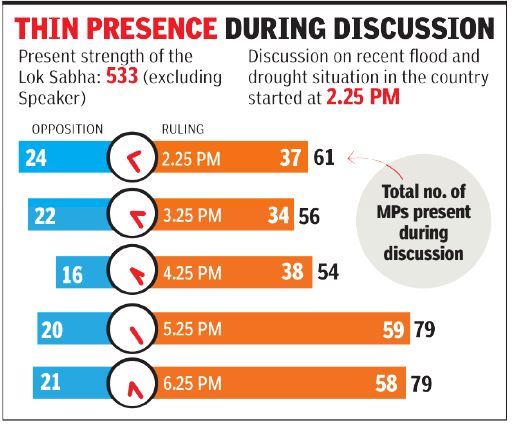
From: July 26, 2018: The Times of India
Parliamentarians of all hues may be quite vocal on issues concerning farmers, but Lok Sabha witnessed presence of only 10-15% of its members when the House took up a discussion on the recent flood and drought situation in various parts of the country.
The discussion along with the government's comprehensive reply lasted five hours, touching the crucial issue of farm distress due to natural disasters and what all the Centre has been doing to provide relief to the affected states.
The members prioritised the discussion by deciding not to take up listed bills on Wednesday. But their sincerity to discuss the issue could not ensure their presence in good number in the House.
Only 61 members (24 from opposition parties and 37 from the ruling alliance) were present in the House when Lok Sabha took up the discussion at around 2.25pm. The numbers went down to as low as 54 (barely the number required for quorum) two hours later.
Though the number increased to 79 towards the end, the opposition bench at one point (4.35pm) was virtually empty as only 10 members could be seen present during the discussion.
Most of the opposition members demanded adequate financial assistance from the Centre to deal with the situation so that the states could immediately provide relief to affected people.
The government fielded three ministers - agriculture minister Radha Mohan Singh, his deputy GS Shekhawat and minister of state for home affairs Kiren Rijiju -to respond to the members' concerns. They assured the House that the Centre would not discriminate against any state while providing funds.
The discussion was initiated by CPM member from Kerala, P Karunakaran, who spoke about floods in his state. BJP member Sanjay Jaiswal raised the drought issue in Bihar and suggested the House discusses flood and drought in the winter session so that a policy can be worked out before-hand for the next year.
Performance of MPs
Delhi’s MPs
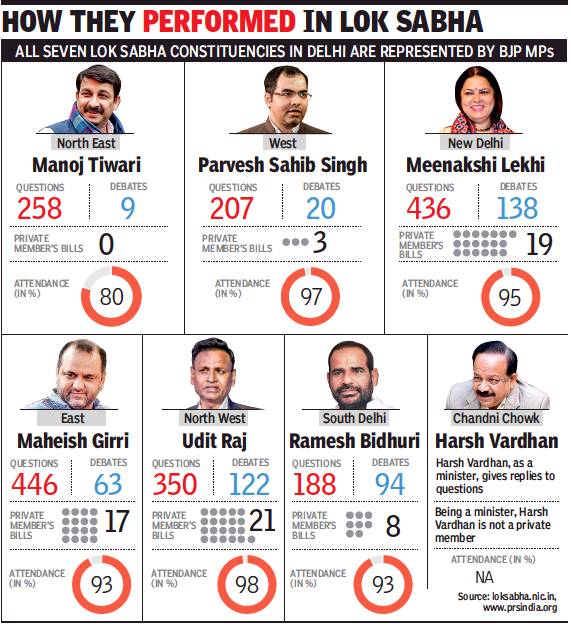
From: AlokKNMishra, Among Delhi MPs, Raj, Girri and Lekhi outshone others in House, March 7, 2019: The Times of India
How well did the Delhi MPs fare in Parliament? Did they represent their constituencies and the city well and ensure their presence? It’s time to do a review based on information that’s in the public domain.
Among the seven MPs of Delhi, all from BJP, East Delhi MP Maheish Girri asked the maximum number of questions in Parliament in the past five years while South Delhi MP Ramesh Bidhuri posed the least. The questions ranged from issues of development to unauthorized colonies and the sealing drive besides others.
North-West Delhi MP Udit Raj had the maximum attendance of 98% followed by Parvesh Sahib Singh (West) with 97%, Meenakshi Lekhi (New Delhi) with 95%, Maheish Girri (East) and Ramesh Bidhuri (South) with 93% and Manoj Tiwari (North East) with 80%. The attendance of Harsh Vardhan, a minister, was not available.
BJP sources said that despite holding the post of the Delhi BJP chief which demanded strong organisational commitment, Tiwari had managed to attend fairly regularly. “He did it despite being involved in protests to counter the misgovernance of the Arvind Kejriwal government and fighting against sealings,” said the sources. Significantly, he proposed “No work, no pay” to deal with the unruly behaviour of MPs.
According to Parliament records, Girri asked 446 questions as against Bidhuri’s
188. “I raised the issues of regularisation of unauthorized colonies, sealings, lack of water supply and development of Delhi. The biggest roadblock in the regularisation of the unauthorized colonies is the Arvind Kejriwal government,” said Bidhuri. He said he had actually asked a large number of questions but because the selection is done on the basis of draw of lots, many did not get included.
New Delhi MP Meenakshi Lekhi, a lawyer, figured as a keen debater — participated in 138 debates — while Tiwari, as against his profile outside, was rather silent in the house, with only nine debates to show. Being a minister, Harsh Vardhan could not ask questions but was forthcoming with is views in 47 debates.
Session-wise productivity
2014
Budget session
Productivity of LS climbs to 103%
Himanshi.Dhawan @timesgroup.com The Times of India Aug 02 2014
Much like in government, the winds of change are blowing in the corridors of Parliament. After a deadlock of nearly three years, there is a flurry of activity on the floor of the two Houses. In the last three weeks, the 16th Lok Sabha recorded a productivity of 103% as discussions went past allotted hours, in contrast to the 15th Lok Sabha that worked for only 61% of the scheduled time.
Even if only Budget sessions are considered, the productivity of the LS is up steeply from 49% in 2013.
It is the first-time lawmakers who are leading the charge. In 2014, participation of first-time MPs in the debate on demand for grants increased by 58% with 158 firsttimers speaking on the subject as compared to 100 in 2009.
Analysis by independent body PRS Legislative Research shows a 41% increase in participation by new MPs in the railway budget discussion.
Interest in the general budget was also high, with 26% more participation by legislators in 2014 as opposed to 2009.
In all, participation by first-timers was up 38.5% compared to veterans whose participation increased by 27% between 2009 and 2014. There are 314 first-time MPs in this Parliament, up from 302 in 2009.
While it is early days yet, there is reason to believe this is not a flash in the pan. Organizations such as PRS and Swaniti that work closely with parliamentarians say they find greater awareness and accountability among legislators.
Winter session
The Times of India Dec 24 2014 Lok Sabha worked for 98% of winter session Himanshi Dhawan The most productive winter session for the Lok Sabha so far was in 2004 when it had worked for 101% of the scheduled time. BJP's strong majority in the LS has meant smooth sailing for the party but its According to data analysed by PRS Legislative Research, the LS spent 44% of its productive time on discussing various issues, 35% on legislation and 14% on answering questions.
`Bid To Focus On Godse's Ideology'
After announcing its plans to build a temple to Nathuram Godse in Sitapur, the Akhil Bharat Hindu Mahasabha (ABHM) has decided to mark January 30, observed as Martyrs Day, as ‘shaurya divas’. Godse had assassinated Mahatama Gandhi on that day in 1948.
Observing ‘shaurya diwas’ on January 30 is an attempt to bring forth Nathuram Godse’s ideology, said Kamlesh Tiwari, working president of the Akhil Bharat Hindu Mahasabha.
On December 23, TOI had reported the Hindu Mahasabha’s plans to build a temple dedicated to Godse. Some Hindu Mahasabha members want to perform ‘bhumi pujan’ of the temple on January 30. But Tiwari told TOI the ceremony would in all likelihood be performed between February 15 and February 25. The organization will observe `shaurya divas' in 20 cities throughout the country , Tiwari said. The cities include Mumbai, Aurangabad, Thane, Pune, Hyderabad, Indore, Gwalior, Ahmedabad, Anand, Surat, New Delhi, Lucknow, Gorakhpur, Bareilly and Sitapur.
On the day, members of the Hindu Mahasabha will assemble in parks and community centres, put up a photograph of Godse and hold a garlanding ceremony , said Tiwari, who represents the Hindu Mahasabha in the Ram Janmabhumi dispute case. He said so far Godse was known as Gandhi’s killer, and even the Hindu Mahasabha did not support killing. “But people should understand that Godse didn’t kill Gandhi for his personal interest,” said Tiwari. The Hindu Mahasabha will also demand that the court proceedings of Godse’s trial be made public and the government stops identifying him as a traitor, Tiwari said.
2015
Budget session: high productivity
The Times of India, Mar 21 2015
Lok Sabha sees 10-yr-high productivity this session
Himanshi Dhawan
Lok Sabha members worked harder than their predecessors in the last decade with the just-concluded budget session registering productivity of 121%.Despite disruptions and adjournments the House of Elders also did not fare too badly notching productivity of 109%, only second to the 2009 budget session. The data compiled by independent think-tank, PRS Legislative Research, reveals that this LS session surpassed the monsoon session in 2005 that worked for 110% of the time, while the highest productivity for RS has been in the 2009 budget session that worked for 113% of the scheduled time. Productivity is considered on the number of hours the House sits as compared to the number of hours scheduled.
Question Hour in Rajya Sabha functioned for 98% of the scheduled time while Lok Sabha members were able to get responses 88% of the time. The lowest productivity in the last 10 years has been in winter session of 2010 when the LS worked for merely 6% of the time and the RS worked for 2% of the time.
Official data from the parliamentary affairs ministry is also flattering: The LS worked for 123.45% of the time, working an additional 23 hours 45 minutes while the RS registered productivity of 106.79%.Among the significant bills that have passed include the Insurance Laws (amendment) bill, Motor Vehicles (amendment) bill and Citizenship (amendment) bill. Commenting on the passing of mines and minerals bill and the coal mines bill that replace ordinances parliamentary affairs minister M Venkaiah Naidu said, “The Parliament has enabled the beginning of a new era of transparent governance in the country by ending the government's discretion in allocation of minerals which has come to be a cesspool of corruption and malpractices.
Monsoon session
Barricades erected
The Times of India, Aug 13 2015
In a first, barriers erected in LS
Barricades were put up on either side of the secre tary general's table in the Lok Sabha on Wednesday , blocking members from accessing the Speaker's chair. The move came after nearly three weeks of unruly protests where opposition members, led by Congress, used placards to block the Speaker's vision. Members were also seen climbing on the low platform that was meant for the secretary general's chair and leaning on it. This is probably the first time that a portion of the House has been fenced. Besides sloganeering and holding placards in front of the Speaker's chair, banging placards on the Speaker's table, members also tore paper and flung bits around, forcing adjournments.`Incensed' Sonia troops into well, stuns all: “Kya... kya kaha... what did he say about me?“ This is how Congress chief Sonia Gandhi reacted to a caustic accusation about a family member hurled by BJP parliamentarians. The provocation for saffron members was Mallikarjuna Kharge's comment that Lalit Modi had a strong business relationship with Rajasthan CM Vasundhara Raje, a fact he repeated many times despite the Speaker's observa tion that a non-mem ber could not be named in Lok Sabha.
Sonia took serious objection to the personal insinuation and walked into the well, standing right in front of the Speaker's chair and protesting vigorously . In tow were Congress MPs appearing equally offended. As the confrontation flared, the Speaker adjourned the House. Sonia was then surrounded by colleagues in deep discussion for some time before lunch.Sonia rushing into the well surprised everyone, with an MP saying, “It is another first in Parliament history...first time Sonia going into the well.“
Productivity of LS and Rajya Sabha

Aug 14 2015
Himanshi Dhawan
RS worked for only 9% of allotted time
In total washout, only 1 Bill passed in session
Only one legislation was passed by Parliament during the 17-day monsoon session with Rajya Sabha working for barely 9% of the allotted time, only marginally up from the infamous winter session of 2010 when the House functioned for just 2% of the time. Lok Sabha, aided by the explusion of 25 Congress members for five days, managed to work for almost half the time (48%) allotted to it. The Delhi high court (amendment) bill 2014 was the only bill -excluding money bills--to have been passed by both Houses. According to Parliament data, the Lower House lost 47 hours and 27 minutes, the Upper House lost 82 hours to disruptions with important legislations like the land acquisition bill, GST bill and whistleblowers protection bill getting delayed.
The session witnessed the lowest number of bills being passed in the last five years. This productivity is in sharp contrast to the budget session this year, which was the most productive session in the last 15 years. During the last session, RS had a productivity of 101%.
As a result of continuous disruptions during Question Hour, only 2% of questions were answered orally while only 1% of the time was spent on legislative business in RS.
In comparison, LS spent 17% of its productive time on legislative business, and 45% on non-legislative business. About 13% of questions were answered orally during Question Hour.Three bills including the Negotiable Instruments (amendments) bill 2015, SC and ST (prevention of atrocities) bill 2014 and Repealing and Amending (fourth) bill 2015 were passed in LS but were discussed for less than three hours, says analysis by PRS Legislative Research.
Despite a lame duck session, the performance of individual parliamentarians was enthusiastic. PRS data show that overall attendance was as high as 75%. Attendance in LS was at 84%, while in RS it was at 78%. In LS, the highest participation was seen in MPs between 56 to 70 years of age. A LS MP participated in about 20 debates on average. However, 48 MPs (9%) from that House did not participate in any debates, of which 27 were first time MPs. Among parties with more than 10 MPs, Shiv Sena MPs had high participation, with 25 debates on average for each MP. This was followed by BJD and Congress, with about 20 debates per MP.
2016
Budget session
What is more interesting is the fact that the productivity stats of both houses of Parliament,- Lok Sabha as well as Rajya Sabha, is impressive.
The productivity of Lok Sabha in this session stands at a staggering 121% while the Rajya Sabha is not far behind with 91% productivity, according to the analysis done by PRS Legislative Research.
It should be recalled that with 122% productivity, Budget Session 2015 was Lok Sabha’s most productive session in last 15 years. And at 121%, the productivity of Budget Session 2016 is second highest in last 15 years.
Rajya Sabha’s productivity in this session is commendable in view of the fact that the upper house of the parliament had a poor productivity of 51% and 9% in Winter and Monsoon Sessions of 2015 respectively.
In fact, the productivity of Rajya Sabha in first part of Budget session was 105% and it slumped to 79% during part II.
The productivity of the two houses during the crucial ‘Question Hour’ is equally impressive. In Lok Sabha, the ‘Question Hour’ functioned for 93 % of its scheduled time while in Rajya Sabha the percentage stands at 72%.
The Lok Sabha, in fact, broke the record of maximum number of orally answered questions in last 15 years. A total of 145 questions were orally answered in Lok Sabha in this session, the highest in the past 15 years.
This session has will also be remembered for highest percentage of Bills introduced and passed within same session in 10 years.
In terms of legislative business, 9 bills were introduced and 17 bills were passed by both houses during the Session.
Rajya Sabha passed five Bills while Lok Sabha passed one Bill without any debate.
Interestingly, 12 of the 17 Bills passed in this session were not referred to any Parliamentary Standing or Select Committee.
The Lok Sabha worked for a total of 198.1 hours while the Rajya Sabha functioned for a total of 150.2 hours.
The Budget Session 2016 was convened from February 23 to March 16, and from April 25 to May 13, 2016. However, during the recess period, Parliament was prorogued to allow the government to issue an Ordinance. When Parliament convened again on April 25, 2016, it was a new session.
PRS Legislative Research, however, has clarified that for this analysis, these two sessions have been treated as one Budget session.
Monsoon session
The Hindu, August 12, 2016
Samarth Bansal
The Monsoon Session of Parliament was ‘highly productive’, Mr. Hamid Ansari, Chairman of Rajya Sabha, mentioned in the valedictory remarks at the conclusion of the session today. Various bills were passed and a variety of issues were discussed in the 20 sittings of the house that lasted over 112 hours.
Rajya Sabha met for 96 per cent of its scheduled time in the current session compared to 76 per cent in the previous sessions since May 2014, which implies that lesser time was lost to disruptions. Lok Sabha met for 101 per cent of its scheduled time, almost similar (102 per cent) to the previous sessions of the current Parliament.
Both houses sat for extra time on most days.
Rajya Sabha set beyond its scheduled time on 14 of the 20 days of this session whereas Lok Sabha did so on 11 days.
Parliament has regularly been discussing a variety of issues since 2004, including internal security, inflation, natural calamities, agriculture and corruption.
Where did Parliament spend its time?
Rajya Sabha spent 29 per cent of its time and Lok Sabha spent 38 per cent of its time on legislative purposes.
Rajya Sabha spent most of its time — 52 per cent — and Lok Sabha spent 40 per cent of its time on non-legislative business, discussing issues like inflation, atrocities against Dalits and recent incidents in Kashmir.
Bills passed
Seven of the 14 bills that were introduced were passed in this session itself. This includes Lokpal and Lokayuktas (Amendment) Bill which was passed in less than half an hour in each House, the Taxation Laws (Amendment) Bill and the Maternity Benefits (Amendment) Bill were introduced and passed by one House on the same day. Overall, 14 bills were passed in this session.
Fewer Bills being referred to committees
Only 31 per cent of the bills introduced in the 16th Lok Sabha have been referred to a Parliamentary committee, compared to 71 per cent in 15th Lok Sabha and 60 per cent in 14th Lok Sabha. During this session, the Citizenship (Amendment) Bill was referred to a Joint Parliamentary Committee for detailed examination.
How much time does it take to pass an amendment?
Of the total 101 amendments made to the Constitution of India, 11 took more than a year to be passed, including the GST Constitutional Amendment Bill which was passed in this session. Others that took over a year provide for the Right to Education and State Level Rent Control Tribunals. An amendment related to co-operative societies took over two years to get passed.
Previously, three amendments, the ones relating to proclamation of emergency in states and inclusion of languages, have been passed in less than a day.
Winter session

From: PRS Legislative Research
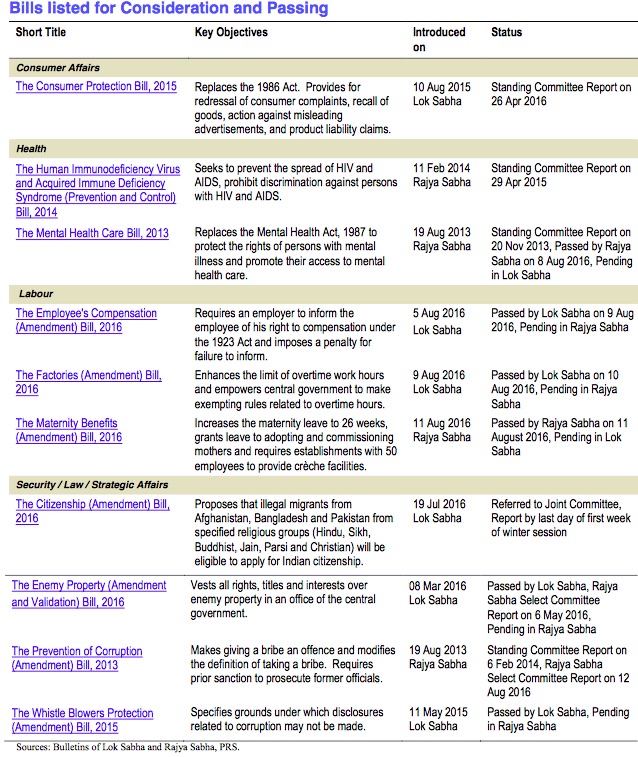
From: PRS Legislative Research

From: PRS Legislative Research

From: PRS Legislative Research

From: Parliament's Winter Session or wasted session? Rajya Sabha scores zero on productivity scale, December 6, 2016: Firstpost
The Winter Session of Parliament began on 16 November. On 8 December, both the Houses — Lok Sabha and Rajya Sabha — met for 17th day but within minutes of commencing, both the Houses were adjourned. The deadlock over demonetisation has led to wastage of the Winter Session so far and considering that just one more week is left for the session to wrap up, there is little hope that the Houses will be able to pass, introduce or even debate the Bills that have been listed for consideration.
Both the Lok Sabha and the Rajya Sabha failed to conduct any substantive business as Opposition continuously created pandemonium, leading to early adjournment of the two Houses on multiple occassions. This has been the scene since the Winter Session began. The Narendra Modi government was expecting a stormy Session with the Opposition presenting a united face in seeking to corner the government over the demonetisation issue calling it a "currency scam" that needs to be probed. However, such low productivity was unexpected.
Analysis by Delhi-based think tank PRS Legislative, which tracks the functioning of the Indian Parliament, found that productivity of Lok Sabha this Winter Session was 14 percent whereas productivity of Rajya Sabha was 20 percent. PRS data also showed that Rajya Sabha spent zero hour on questions, whereas, the Lok Sabha spent 5.1 hours. Rajya Sabha spent 11.8 hours on non-legislative issues while the Lok Sabha spent 4.3 hours on the same.
Question Hour, considered the most crucial hour of Parliament — it is the first hour of a sitting session of Lok Sabha and Rajya Sabha devoted to questions that MPs raise about any aspect of administrative activity. The concerned minister is obliged to answer to Parliament, either orally or in writing, depending on the type of question raised. PRS data tells us that Rajya Sabha's productivity in Question Hour has been zero percent compared to Lok Sabha's 33 percent. In Lok Sabha, ministers replied to 37 questions orally, while in Rajya Sabha only one question was answered. It is important to keep in mind that Winter Session constitutes of 22 sittings — 17 of which are over. Therefore, in the remaining days, these numbers are not expected to change too much.
From the day Winter Session began till Thursday, only two topics were debated in Lok Sabha — demonetisation of currency notes to weed out black money and delay in landing of a private aircraft carrying Chief Minister of West Bengal Mamata Banerjee and other passengers due to air traffic at Kolkata airport. In comparison, Rajya Sabha discussed "delay in landing of flight at Kolkata Airport carrying Mamata Banerjee and other passengers." If PRS data is any indication, the Rajya Sabha, which is supposed to be the House which reviews the bills presented in the Lok Sabha, has been the biggest failure of the Winter Session. See the image below for daily time breakup in Rajya Sabha. From 17 November till 6 December, the Upper House has spent zero hours doing anything productive. Instead, spent 0.72 hours discussing 'other' issues.
As far as business is concerned, Lok Sabha did four percent legislative business compared to Rajya Sabha's one percent. But figures get bold when it comes to non-legislative business that the Houses did — Lok Sabha conducted 32 percent of non-legislative business while Rajya Sabha conducted 64 percent.
Ahead of the Winter Session, Prime Minister Narendra Modi had met Opposition leaders and sought their cooperation in the fight against black money and corruption for which, he said, the demonetisation exercise was undertaken. The government is willing to discuss all issues and answer the questions raised by the opposition, Modi had said, hoping for a fruitful session as he recalled the passage of the GST Bill in the last session with the cooperation of all parties. An unrelenting Opposition, however, had decided to step up and put up a strong fight against the government.
The thing that our MPs forget here is that the time wasted in Parliament is not theirs to waste.
While our MPs and legislators waste slinging mud at each other, it is also important to remember that the legislators argue and counter-argue at the cost of the exchequer and eventually taxpayer. As of 2012, each minute of running Parliament during sessions costs the exchequer Rs 2.5 lakh. "In one year, Parliament runs for eighty days during sessions. Each day, business in both Houses are transacted for around six hours. If we take into account the total annual expenditure on Parliament, then for each minute of running the House costs Rs 2.5 lakh," then parliamentary affairs minister Pawan Kumar Bansal had told reporters back in 2012.
But its wrong to view the cost of parliamentary disruptions in monetary terms. The stakes are much larger.
But we should get used to this by now. The Winter Session of 2015 was similar. The Opposition, led by the Congress, did not let the government function. The BJP lacked the political precision to thwart the rivals.
Result: This session witnessed the lowest number of bills being passed since the Winter Session of 2010. This figure will soon change since the Winter Session of 2016, as PRS data suggests, has passed just one bill so far.
2017
Budget session

Lok Sabha passed 21 bills while Rajya Sabha passed 14 bills, including the crucial GST bills, in the budget session of the Parliament
New Delhi: The second half of the budget session of Parliament, which ends on Wednesday, has been favourable to the ruling National Democratic Alliance, which not only managed to push its economic reforms agenda but also put up a united front. Prime Minister Narendra Modi on Tuesday told the parliamentary party of the Bharatiya Janata Party that the session was a victory for the Union government.
“Prime Minister Narendra Modi told BJP parliamentarians that BJP was victorious in the budget session because apart from bills related to crucial goods and services tax (GST), Lok Sabha passed 21 bills while Rajya Sabha passed 14 bills,” said Ananth Kumar, parliamentary affairs minister.
The BJP leadership is also upbeat because its recent victories in assembly polls have silenced the opposition. BJP leaders have argued that the wins in Uttar Pradesh, Uttarakhand, Goa and Manipur showed government policies were appreciated by the people.
According to data by New Delhi-based PRS Legislative Research, productivity in the second half of the budget session as of Monday for Lok Sabha and Rajya Sabha was 112% and 87%, respectively. A total of 12 bills were passed by both the houses, including The Enemy Property (Amendment and Validation) Bill, 2016, The Mental Health Care Bill, 2013, The Maternity Benefits (Amendment) Bill, 2016, The Payment of Wages (Amendment) Bill, 2017 and the four supporting bills to roll out the GST.
Work got done despite the government and opposition parties being locked in a bitter political tussle on issues such as racial attacks on Indians in the US, petrol and diesel price hike, whether Aadhaar was needed to access welfare benefits, and allegations that Electronic Voting Machines (EVMs) were tampered with.
“The country expected that at the end of the budget session, thanks to the debates and the information provided by the government, there would be greater clarity about the state of the economy. Unfortunately, there is no such clarity. At the end of the session, we are no wiser than we were at the beginning of the session,” P. Chidambaram, former Union finance minister and senior Congress leader, said in a press release, adding that from the point of view of assessing the state of the economy, this was an “unsatisfactory” session. Wednesday will mark the end of the budget session which began on 31 January and was held in two parts, including a month-long recess.
Monsoon session
Rajya Sabha logged 80% productivity, Lok Sabha 78% this session , Aug 12, 2017: The Times of India
NEW DELHI: The monsoon session of Parliament came to an end with Rajya Sabha working for nearly 79.95% of the scheduled hours and the Lok Sabha clocking a shade lesser sitting for 77.94% of its allotted time. The lower House, however, passed more bills as compared to the upper House which spent more time on non-legislative business.
A higher proportion of the productive time (nearly 40%) in Lok Sabha was spent on legislative business including passing of 14 bills. However, the lower House also saw suspension of six Congress members for five days for hurling papers at the Chair.
On the other hand, a higher proportion of the time was spent on non-legislative business (nearly 42%) in Rajya Sabha which discussed incidents of mob violence and lynching, India's foreign policy and agrarian crisis facing the country among other issues in its 19 sittings during the monsoon session from July 17 to August 11. The Upper House passed nine bills.
One of the highlights of the session was M Venkaiah Naidu taking over as the new Chairman of the Rajya Sabha. Another landmark moment was the special discussion in both Houses to commemorate the 75th anniversary of the country's 'Quit India Movement'.
Parliamentary affairs minister Ananth Kumar, addressing a press conference after end of the session, said passing of the the bills relating to extension of GST to J&K was a "historic achievement" as it will lead to economic integration of the state with rest of the country.
"Thirteen bills were passed by both the Houses. This has been an achievement considering that it was a short session ," said Kumar.
Besides the bills relating to extension of GST to J&K, the other bills which were passed by both the Houses include National Institutes of Technology, Science Education and Research (Amendment) Bill, Indian Institutes of Information Technology (Public Private Partnership) Bill, Right of Children to Free and Compulsory Education Bill and the Banking Regulation (Amendment) Bill, 2017.
Winter session
January 5, 2018: Press Information Bureau
Ministry of Parliamentary Affairs
Winter Session of Parliament 2017 concluded Productivity of Lok Sabha 91.58% and that of Rajya Sabha 56.29%. 13 Bills passed by both the Houses of Parliament Budget Session of Parliament 2018 to commence from January 29, 2018
The Winter Session 2017 has been a successful session in terms of the legislative business conducted and wide participation of all political parties in discussions on various issues of national importance, said Shri Ananthkumar, Union Minister for Parliamentary Affairs and Chemicals & fertilizers, while addressing the media here today. Shri Vijay Goel, Minister of State for Parliamentary Affairs and Statistics and Programme Implementation and Shri Arjun Ram Meghwal, Minister of State for Parliamentary Affairs and Water Resources, River Development and Ganga Rejuvenation, were also present on the occasion.
Shri Ananthkumar informed that the Winter Session, 2017 of Parliament which commenced on Friday, the 15th December, 2017, concluded on Friday, the 5th January, 2018. The Session provided 13 sittings spread over a period of 22 days. The productivity of Lok Sabha was 91.58% and that of Rajya Sabha was 56.29%.
During the Session, 14 Bills )14 in the Lok Sabha( were introduced. The Lok Sabha passed 13 Bills and while the Rajya Sabha passed 9 Bills during the session. 13. *Bills were passed by both the Houses of Parliament.
Shri Ananthkumar said that the Government is committed to pass important bills like Triple Talaq Bill and National Commission for Backward Classes Bill and cooperation from all parties is expected on such issues of national importance. The Minister added that as recommended by the Cabinet Committee on Parliamentary Affairs (CCPA), Budget Session of Parliament commenced from January 29, 2018.
Regarding the Legislative Business carried out during the Winter Session 2017, it was informed that during the Session, Second and Third batches of Supplementary Demands for Grants for 2017-18 and the related Appropriation Bills, were introduced, discussed and passed by the Lok Sabha. These Bills were transmitted to Rajya Sabha and could not be taken up for consideration and as they are not likely to be returned to Lok Sabha within the period of fourteen days from the date of their receipt in Rajya Sabha, the Bills will be deemed to have been passed by both Houses at the expiration of the said period in the form in which they were was passed by Lok Sabha under clause (5(of article 109 of the Constitution.
Three Bills replacing the Ordinances, namely, the Goods and Services Tax (Compensation to States) Amendment Ordinance, 2017, the Indian Forest )Amendment(Ordinance, 2017 and the Insolvency and Bankruptcy Code (Amendment(Ordinance, 2017 which were promulgated by the President, were considered and passed by Lok Sabha. Only one Bill replacing an Ordinance namely the Central Goods and Services Tax )Compensation to States(Bill, 2017 could not be taken up by Rajya Sabha. As this Bill is a money Bill and not likely to be returned to Lok Sabha within the period of fourteen days from the date of its receipt in Rajya Sabha, the Bill will be deemed to have been passed by both Houses at the expiration of the said period in the form in which it was passed by Lok Sabha under clause(5) of article 109 of the Constitution.
Apart from the above the other major highlight of the Session is the passing of the National Bank for Agriculture and Rural Development )Amendment(Bill, 2018, the Companies )Amendment(Bill, 2017, the Indian Institute of Management Bill, 2017and the Indian Institute of Petroleum and Energy )IIPE(Bill, 2017 by both Houses of Parliament.
In the Lok Sabha, one Short Duration Discussion, under Rule 193, was held on Natural calamities in various parts of the country with special reference to cyclone Ockhi in South India.
In the Rajya Sabha, two Short Duration Discussions under Rule 176 were held on )i( Excessively high levels of air pollution in Delhi; )ii(State of economy, investment climate and job creation in the country and the need to address the challenge of rising unemployment.
*The Bills, as passed by Lok Sabha and transmitted to Rajya Sabha for its recommendation, are not likely to be returned to Lok Sabha within the period of fourteen days from the date of their receipt in Rajya Sabha. The Bills will be deemed to have been passed by both Houses at the expiration of the said period in the form in which they passed by Lok Sabha under clause (5) of article 109 of the Constitution.
Legislative Business transacted during Thirteenth Session of Sixteenth Lok Sabha and 244thSession of Rajya Sabha (Winter Session, 2017) :
I – BILLS INTRODUCED IN LOK SABHA
1. The National Council for Teacher Education (Amendment) Bill 2017
2. The Payment of Gratuity (Amendment) Bill, 2017
3. The Dentists (Amendment) Bill, 2017
4. The Indian Forest (Amendment) Bill, 2017
5. The Representation of the People (Amendment) Bill, 2017
6. The High Court and the Supreme Court Judges (Salaries and Condition of Services) Amendment Bill, 2017
7. The Specific Relief (Amendment) Bill, 2017
8. The Central Goods and Services Tax (Compensation to States) Bill, 2017
9. The National Capital Territory of Delhi Laws (Special Provisions) Second (Amendment) Bill, 2017
10. The Muslim Women (Protection of Rights on Marriage) Bill, 2017
11. The Insolvency and Bankruptcy Code (Amendment) Bill, 2017
12. The Appropriation (No.5) Bill, 2017
13. The National Medical Commission Bill, 2017
14. The Negotiable Instruments (Amendment) Bill, 2018
15. The Consumer Protection Bill, 2018
16. The New Delhi International Arbitration Centre Bill, 2018
17. The Appropriation Bill, 2018
II – BILLS PASSED BY LOK SABHA
1. The Repealing and Amending Bill, 2017
2. The Repealing and Amending (Second) Bill, 2017
3. The Central Road Fund (Amendment) Bill, 2017
4. The Requisitioning and Acquisition of Immovable Property (Amendment) Bill, 2017
5. The Indian Forest (Amendment) Bill, 2017
6. The Appropriation (No.5) Bill, 2017
7. The National Capital Territory of Delhi Laws (Special Provisions) Second (Amendment) Bill, 2017
8. The Central Goods and Services Tax (Compensation to States) Bill, 2017
9. The Muslim Women (Protection of Rights on Marriage) Bill, 2017
10. The Insolvency and Bankruptcy Code (Amendment) Bill, 2017
11. The Ancient Monuments and Archaeological Sites and Remains (Amendment) Bill, 2017
12. The High Court and the Supreme Court Judges (Salaries and Condition of Services) Amendment Bill, 2017
13. The Appropriation Bill, 2018
III – BILLS PASSED BY RAJYA SABHA
1. The Companies (Amendment) Bill, 2017
2. The Indian Institute of Management Bill, 2017
3. The Indian Forest (Amendment) Bill, 2017
4. The Indian Institute of Petroleum and Energy (IIPE) Bill, 2017
5. The National Capital Territory of Delhi Laws (Special Provisions) Second (Amendment) Bill, 2017
6. The Repealing and Amending Bill, 2017
7. The Repealing and Amending (Second) Bill, 2017
8. The Insolvency and Bankruptcy Code (Amendment) Bill, 2017
9. The National Bank for Agriculture and Rural Development (Amendment) Bill, 2017
IV – BILLS PASSED BY BOTH HOUSES OF PARLIAMENT
1. The Companies (Amendment) Bill, 2017
2. The Indian Institute of Management Bill, 2017
3. The Indian Forest (Amendment) Bill, 2017
4. The Indian Institute of Petroleum and Energy (IIPE) Bill, 2017
5. The National Capital Territory of Delhi Laws (Special Provisions) Second (Amendment) Bill, 2017
6. The Repealing and Amending Bill, 2017
7. The Repealing and Amending (Second) Bill, 2017
8. The Insolvency and Bankruptcy Code (Amendment) Bill, 2018
9. The National Bank for Agriculture and Rural Development (Amendment) Bill, 2018
10. #The Central Goods and Services Tax (Compensation to States) Bill, 2017
11. #The Appropriation (No.5) Bill, 2017
12. #The Appropriation Bill, 2018
13. #The High Court and the Supreme Court Judges (Salaries and Condition of Services) Amendment Bill, 2017
V – BILLS WITHDRAWN
1. The Consumer Protection Bill, 2015
#The Bills, as passed by Lok Sabha and transmitted to Rajya Sabha for its recommendation, is not likely to be returned to Lok Sabha within the period of fourteen days from the date of its receipt in Rajya Sabha. The Bills will be deemed to have been passed by both Houses at the expiration of the said period in the form in which they were passed by Lok Sabha under clause (5) of article 109 of the Constitution.
2018
Budget session
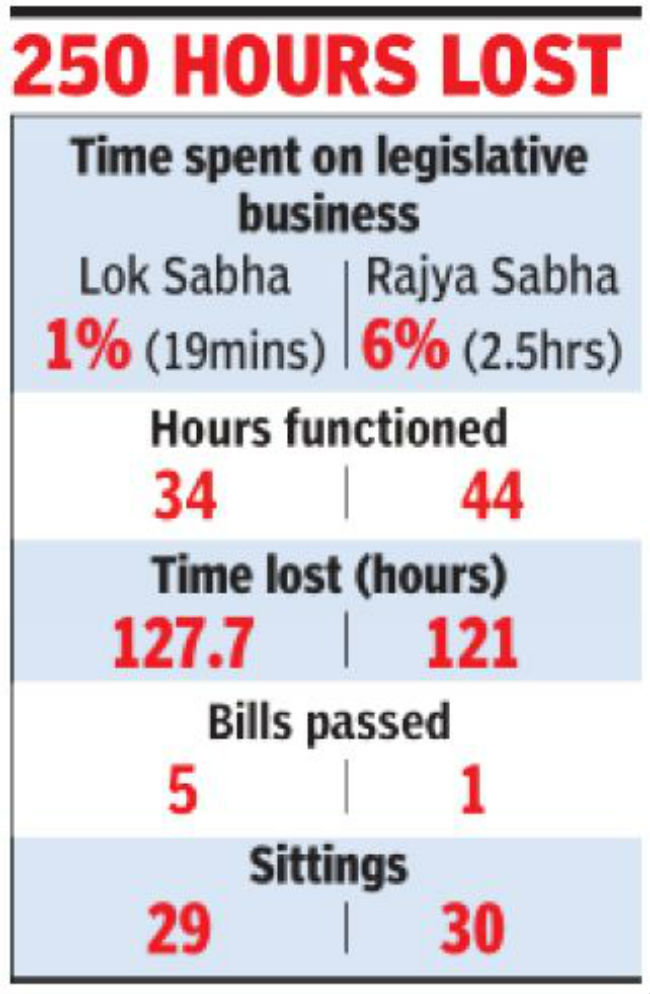
From: Rumu Banerjee, Budget Session: Lok Sabha spent only 1% of allotted time on work, Rajya Sabha 6%, April 7, 2018: The Times of India

From: Rumu Banerjee, Budget Session: Lok Sabha spent only 1% of allotted time on work, Rajya Sabha 6%, April 7, 2018: The Times of India
HIGHLIGHTS
Rajya Sabha spent only three minutes on government bills, Lok Sabha spent 14 minutes
250 hours were wasted, issues like the PNB scam and alleged dilution of the SC/ST Act couldn't come up for discussion
In the budget session which concluded, the Lok Sabha spent just 1% of its allotted time on legislative business even as the Rajya Sabha spent 6%. The actual hours that the Houses sat as against those available was 21% for the LS and 27% for the Upper House. In all, 250 hours were wasted while issues like the PNB scam and alleged dilution of the SC/ST Act couldn't come up for discussion.
The budget session of Parliament was divided into two parts - the first consisted of seven sittings and the second of 23. According to the provisional statement of work, the actual hours the Lok Sabha functioned was 34 hours and 5 minutes while in the Rajya Sabha it was a little over 44 hours. The time lost due to disruptions was many times greater: 127 hours and 45 minutes for the LS and over 121 hours in the RS. The Lok Sabha had 29 sittings and Rajya Sabha 30.
According to PRS legislative research, this was the least productive budget session since 2000. The Upper House spent only three minutes on government bills while it was 14 minutes for the Lower House.
Interestingly, though the Upper House spent 2 hours, 31 minutes discussing legislative business, it spent only three minutes of this time on government bills. The rest of the time was spent on private members' bills. The Lok Sabha spent 19 minutes on legislative business, of which 14 minutes were used up in passing two government bills. In total, while the Lok Sabha passed five bills, the Rajya Sabha passed one. These are fewest since 2014.
Since 2000, on an average, the Lok Sabha has spent 53 hours discussing the Budget, while the Rajya Sabha spent 23 hours. This time, the Lok Sabha spent around 15 hours and the Rajya Sabha barely 11 hours discussing the Budget. Also, while the brief first half was productive, the second barely functioned as TRS, YSR Congress, TDP and AIADMK blockaded both Houses. No-trust motions submitted by the Andhra and Telangana parties, with Congress also filing one, deepened the logjam.
While several MPs gave notices to move no-confidence motions against the government, none were taken up due to disruptions. This was the first time a notice to move a no-confidence motion was given in the 16th Lok Sabha. A no-confidence motion was also moved in the 15th Lok Sabha (2013) but was not discussed. In the 14th Lok Sabha, a no-confidence motion was converted to a confidence vote, which the government won.
In the second part of the session, the Finance Bill was passed in the Lok Sabha in 18 minutes, without any MP's participation. This was the lowest time spent on discussing the Finance Bill since 2000. The longest time spent was 12 hours and 48 minutes in 2003. The Finance Bill typically contains only tax proposals. However, this year, it included amendments to 18 Acts unrelated to taxation, said PRS analysis.
More importantly, the number of discussions on matters of public importance was the lowest since 2014. While the budget and monsoon sessions in 2017 had over 20 discussions in the Lok Sabha, this session, both the Lok Sabha and the Rajya Sabha had only one discussion. Matters of public importance include discussion under Rule 193, Rule 176, calling attention motion and motion of thanks.
‘Shortest discussion on Budget since 2000’
Rumu Banerjee, ’Shortest discussion on Budget since 2000’, April 4, 2018: The Times of India

From: Rumu Banerjee, ’Shortest discussion on Budget since 2000’, April 4, 2018: The Times of India
Budget session 2018 has a dubious distinction — it will have approved a Budget of over Rs 24 lakh crore with members of Parliament spending less than a day of discussion on it.
In this Budget session, conducted in two phases, MPs in Lok Sabha spent only 14 and half hours debating the Budget while Rajya Sabha spent even less — 10.9 hours. It’s the least amount of time spent by Parliament deliberating the Budget since 2000, for which it was convened.
In previous sessions, the average amount of time debating the budget has usually been around 20% or 33 hours of the Parliament’s allotted time.
In terms of productivity though, 2018 session was the fourth worst. Data by PRS Legislative, which collated session sittings and bills passed from the year 2000, shows that the winter session in 2010 saw even fewer hours of productive work, as did sessions in 2013 and 2016.
The percentage of time utilised by MPs was a staggeringly low of 6% in 2010 while it was barely better in 2013 and 2016 at 15% in Lok Sabha. Rajya Sabha didn’t do any better either, using only 2% of available hours in 2010.
The primary scrutiny of the budget is done on the floor of the House through general discussion and detailed deliberations on the demand for grants of various ministries. In the general discussion, the House discusses the budget, which lasted for only a few hours in this budget session. A general discussion is followed by a discussion on demand for grants of specific ministries.
The utilisation of Question Hour has also been low this session. While only 16% of the scheduled time was used to ask questions in Lok Sabha, Upper House fared worse at 5 per cent. The Question Hour is traditionally time utilised by MPs to grill the government on policies and other isses of public interest. It is a way to hold the government accountable for its actions.
Monsoon session
No-confidence motion: NDA won 325-126
July 21, 2018: The Times of India
In the first no-confidence motion in Parliament in 15 years, 39 MPs spoke for almost 12 hours, but at the end of the day, all eyes were on the face-off between the Congress president and the PM. The govt sailed through with a bigger margin than expected, but with LS elections looming, the drama has just begun
NDA Wins 325-126 With AIADMK Backing And BJD, TRS Abstentions
Marked by moments of high drama and histrionics, the no-confidence debate in Lok Sabha saw Prime Minister Narendra Modi capitalising on Rahul Gandhi’s surprise hug to suggest that the Congress chief’s gesture asking him to get up only reflected an unfounded eagerness to assume the high office.
“Those who want to reach here in a hurry came here and gestured ‘get up, get up’,” Modi said. Gesturing with his hands, he mimicked Rahul’s actions, providing more drama to a 12-hour debate that ended with BJP winning the vote by a large margin, its numbers swelling to 325 with 451 votes cast. The opposition scored a sub-par result with its tally reaching 126 as TRS and BJD walked out. The surprise abstention of Shiv Sena was more than made up by the support of AIADMK.
A combative PM said he would like the opposition to bring another no-confidence motion against him in 2024, implying that BJP was well on its way to returning to office in the Lok Sabha elections next year. He lashed out at Congress, saying its arguments during the no-confidence motion reflected a “deep lack of confidence in itself ”.
Gandhi had ended his speech by walking across to the PM. When Modi did not rise from his seat, he reached down and hugged him. As he walked away, Modi called him back to shake his hand and pat him on his back, even as MPs watched, most of them taken aback.
“Congress has no confidence in itself. It has no belief in Swachh Bharat, in international yoga day, the Chief Justice of India, Reserve Bank of India, the official agency that compiles national data, the rising value of Indian passport, the Election Commission, electronic voting machines... not even in itself,” he said. Its lack of confidence was leading Congress to create uncertainty and instability, said the PM. “If you don’t believe in people, you will find yourself on the run. In a democracy, the people are the ‘bhagya vidhata (makers of destiny)’,” he said. Taking yet another dig at Rahul, he said it wasn’t good enough to say ‘I will be PM as Congress is the biggest party’, others have to say so too.
Modi also responded to Rahul’s jibe that he couldn’t look him in the eye over allegations of corruption in the Rafale deal, saying, “How can I have the courage to do so... a son of a poor mother, who was born in a family of modest means.” He drove the point home, saying the Congress’s first family considered the post to be its preserve.
Rahul hug gave PM a loose ball
On the allegations of graft in the Rafale deal, the PM said the pact was between two nations and chided Rahul not to be “childish” when it came to national security. He said it was unfortunate that the Army chief was being referred to in insulting terms and recalled that contrary to Congress’s allegation that he was soft on China, it was Rahul who had a hushhush meet with Beijing’s envoy during the Doklam standoff. He reminded Sonia Gandhi that her remark “who says we don’t have the numbers” was reminiscent of her 1999 claim of having 272 MPs.
The debate saw Rahul and other opposition leaders launch hard hitting attacks on the government, arguing that BJP had failed on several counts ranging from foreign policy to protecting the interests of farmers. It was often marked by acrimony as leaders hit campaign notes.
Rahul started combatively, blending aggression which has been his trademark since the Gujarat campaign with vitriol. He accused Modi government of duping people by launching “jumla strikes” — a litany of fake promises, in plain English. He also charged the government with hurting the economy, especially the small and informal business, through demonetisation and GST, and for not creating jobs.
However, he went over the top by walking across the aisle to hug a surprised PM. That this was not a pure gesture of peace when he, perhaps carried away by the partisan plaudits, winked at his colleagues, gifting a loose ball to PM who merrily ran away with it.
Swift and seemingly credible rebuttals by governments here and in Paris of his claim on Rafale was another reason Rahul could not set off the tremors he had promised to. His spirited response also saw PM sketching his plank for the coming assembly elections and next year’s battle for Lok Sabha, with issues of political instability, assistance to poor, fight against graft and development emerging as major themes which may be amplified further in his Independence Day speech.
The poll season appeared to have descended early in Lok Sabha, with BJP attacking the opposition motion as lacking rationale other than a desire to oust PM Modi, and outlining the achievements of the NDA government as compared to the record of the Congress-led UPA.
The NDA numbers were intact, with MPs who had reported unwell or who have been in a dissident mode, also turning up to comply with the party whip. The unwelcome surprise for NDA was Shiv Sena’s decision to stay away from the debate and not vote with the government despite the party having issued a whip.
Parliament passes 5 key Bills
Akhilesh Singh, Productive Parliament passes 5 key Bills, August 6, 2018: The Times of India

From: Akhilesh Singh, Productive Parliament passes 5 key Bills, August 6, 2018: The Times of India
Having dispensed with a no-confidence motion at the start of the session, the government’s party floor managers have managed to run the monsoon session of Parliament successfully as several key legislations have been passed with both Houses being equally productive.
Since the current session began on July 18, both the Houses passed five major bills and there is a possibility of passage of key legislations like the bill to grant the National Commission for Backward Classes status of a constitutional authority and a bill to restore automatic arrest for cases under the SC/ ST (Prevention of Atrocities) Act. The NCBC bill has been languishing for the past one year as the opposition forced amendments in Rajya Sabha.
There has beenone day of adjournment in Rajya Sabha when opposition parties protested over BJP president Amit Shah’s remarks on the National Register of Citizens on July 31. Productivity of the current session is in contrast to the preceding budget session — which was a virtual washout as Lok Sabha’s productivity was 4% and Rajya Sabha’s 8%.
Acceptance of the no-confidence motion was key to the session functioning smoothly while negotiations with opposition parties helped, government managers said. The government decided to avoid a logjam after the budget session which was the least productive in the past 15 years. Junior minister for parliamentary affairs Vijay Goel said he met opposition party leaders every morning to sort out issues on pending bills. “Congress and TMC members had some confusion about the disabilities bill. On my request, the minister met them and cleared the confusion. Similarly, the bill regarding monuments was sent to the select committee on the opposition’s request. We have been considerate to opposition’s views and were never adamant,” Goel said.
Smooth functioning of Parliament is remarkable for many reasons as it has happened despite the combined opposition’s bid to corner the government over several issues like lynchings by cow vigilantes, unemployment, political instability in Jammu & Kashmir, alleged dilution of the SC/ST Act by the SC and dilution of reservations in autonomous institutions like IITs.
30% of MPs put up a poor show
Sivakumar b, 30% of MPs put up a poor LS show, August 17, 2018: The Times of India

From: Sivakumar b, 30% of MPs put up a poor LS show, August 17, 2018: The Times of India
Taken Part In Less Than 20 Debates
Nearly 30% (175) of Lok Sabha MPs have participated in less than 20 debates and raised few questions since 2014, when the 16th Lok Sabha was constituted. With just two more sessions to go before the general elections next year, an analysis of the performance of MPs shows there are 25 who have neither participated in any debate nor raised a single question so far.
The data has been culled out from the Lok Sabha website and PRS Legislative Research. TOI looked only at data for MPs who have been there since 2014 and not those who were subsequently elected in a byelection.
The 175 MPs include some senior politicians from all parties and yester-year film stars as well as first-time MPs. The average attendance of these MPs is 73% against the overall average of 80%.
“Generally an MP’s performance cannot be decided based only on their participation in debates or raising questions as they may be doing good work in their constituencies. At the same time, an MP has to be present when the house is in session. Thus if attendance is less than 50% then he or she is not representing those who voted for them,” said Association of Democratic Reforms founder Jagdeep Chokkar.
BJP MP from Porbandar in Gujarat, Vitthalbhai Hansrajbhai Radadiya, has never participated in any debate or raised any question. His attendance is only 15%. Biju Janata Dal MP from Kandhamal, Hemendra Chandra Singh, has 97% attendance but has never participated in any debate or raised a question.
Most of these 175 MPs are educated, with some being doctors or post graduates. “There are three sessions each year and it is easy to participate in not less than five debates each year. At the same time, it also depends on the party whip. If the whip feels an MP is not a good speaker and would not be able to speak on behalf of the party, the MP may not get a chance at all. But nothing prevents the MP from raising questions and presenting himself in the house,” said DMK Rajya Sabha MP TKS Elangovan.
Congress president Rahul Gandhi, former president Sonia Gandhi, former deputy prime minister L K Advani, former Union minister Murli Manohar Joshi and other senior party leaders too have few debates and questions.
Hema Malini, BJP MP from Mathura, has participated in 17 debates in the last four years and raised 209 questions. Her attendance percentage is only 40%. Similarly, Sinha, BJP MP from Patna Sahib, has 68% attendance but has not participated in a single debate.
See also
The 15th Lok Sabha: 2009-14/ The 16th Lok Sabha (2014-19): MPs complete list of MPs / The 16th Lok Sabha (2014-19): trends
